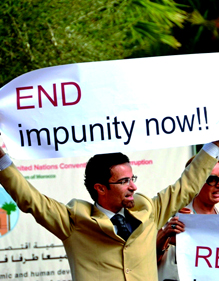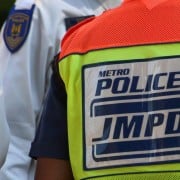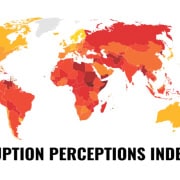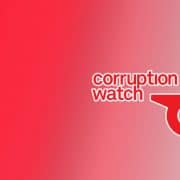|
Getting your Trinity Audio player ready...
|
 Some 47% of South Africans say they have paid a bribe in the last year to secure an essential service – a staggering 20% higher than the global average of 27%, according to the recently released findings of Transparency International’s 2013 Global Corruption Barometer.
Some 47% of South Africans say they have paid a bribe in the last year to secure an essential service – a staggering 20% higher than the global average of 27%, according to the recently released findings of Transparency International’s 2013 Global Corruption Barometer.
The report, which draws on the experiences of 114 000 respondents in 107 countries, examines how corruption affects in people’s lives around the world – and how people are willing to take action to stop corruption.
For the South African slice of the study, 1 000 urban people were surveyed, through face-to-face interviews. Click here to see which institutions South Africans see as the most corrupt and how this compares to the rest of the world's perceptions.
Some 54% of South Africans interviewed felt that corruption levels had increased a lot in the last two years, with 65% asserting that the problem most serious in the public sector.
When asked how effective they thought government’s actions were in fighting corruption, 64% tended towards ineffective, 18% were undecided and 18% believed they were working to some extent.
The barometer also asked respondents how they viewed the extent of corruption in 12 key institutions or categories – from political parties, to parliament, military, NGOs, media, religious bodies, business, education systems, judiciary, health services, police and civil servants.
People were asked to rate these on a scale of one to five – where one means not at all corrupt and five means extremely corrupt. This was the breakdown for South Africa:
- Police – 83%
- Political parties – 77%
- Civil servants – 74%
- Parliament – 70%
- Health services – 55%
- Business – 54%
- Judiciary – 50%
- NGOs – 43%
- Media – 40%
- Education systems – 32%
- Religious bodies – 24%
- Military 11%
Global breakdown: percentages of countries highlighting the above institutions as the hardest hit:
- Political parties – 47%
- Police – 33%
- Judiciary – 18%
- Parliament/legislature – 6%
- Civil servants – 6%
- Health services – 5%
- Media – 4%
- Religious bodies – 3%
- Business – 3%
- Education systems – 0%
- NGOs – 0%
- Military 0%
See our graph comparing these two sets of stats here.
Citizens ready to take action
“Corruption is seen to be running through the foundations of the democratic and legal process in many countries, affecting public trust in political parties, the judiciary and the police, among other key institutions,” says Transparency International in its introduction to the barometer.
“Importantly, however, the people surveyed around the world as a part of the Global Corruption Barometer do not view themselves as powerless victims of corruption. They believe they can be part of the solution.
“Citizen action can lead to the exposure of corrupt acts, the sanctioning of corrupt officials and pressure upon reluctant governments to do more in the fight against corruption. The Global Corruption Barometer underscores the pressing desire of citizens to get involved in stopping corruption.”
What the barometer found
• Bribery is widespread – Overall, more than one in four people (27%) report having paid a bribe in the last 12 months when interacting with key public institutions and services.
• Public institutions entrusted to protect people suffer the worst levels of bribery – Among the eight services evaluated, the police and the judiciary are seen as the two most bribery-prone. An estimated 31% of people who came into contact with the police report having paid a bribe. For those interacting with the judiciary, the share is 24%.
• Governments are not thought to be doing enough to hold the corrupt to account – The majority of people around the world believe that their government is ineffective at fighting corruption and corruption in their country is getting worse.
• The democratic pillars of societies are viewed as the most corrupt – Around the world, political parties, the driving force of democracies, are perceived to be the most corrupt institution.
• Personal connections are seen as corrupting the public administration – People surveyed regard corruption in their country as more than just paying bribes: almost two out of three people believe that personal contacts and relationships help to get things done in the public sector in their country.
• Powerful groups rather than the public good are judged to be driving government actions – More than one in two people (54%) think their government is largely or entirely run by groups acting in their own interests rather than for the benefit of the citizens.
• People state they are ready to change this status-quo – Nearly nine in 10 surveyed say they would act against corruption. The majority of people said that they would be willing to speak up and report an incident of corruption. Two-thirds of those asked to pay a bribe say they refused.
What needs to be done to stamp out corruption
Make integrity and trust the founding principles of public institutions and services
- Governments must operate with transparency and open up their books and activities to public scrutiny.
- Codes of conduct should be developed and adhered to by all public servants.
- Governments should embed transparency in how they work by passing and implementing comprehensive access to information laws.
- Countries should adopt and enact standards for procurement and public financial management, consistent with UN Convention Against Corruption Article 9 and the OECD Principles on Enhancing Integrity in Public Procurement.
- Governments must set up accountability mechanisms and channels that get the public engaged in oversight.
- People should refuse to pay a bribe, wherever asked and whenever possible.
Bring back the rule of law
- Governments should prioritise anti-corruption reforms in the police, based on a thorough analysis of underlying problems.
- Governments must ensure the independence and impartiality of their judiciaries.
- Governments must set up adequate checks-and-balances to ensure that private interests and power groups do not dictate a government’s policies and actions.
Hold the corrupt to account
- All governments must work to end impunity by effectively preventing, detecting, investigating, prosecuting and punishing acts of corruption.
- Elected public officials should not enjoy immunity when charged with corruption offences.
- People should make use of existing reporting mechanisms to speak out about corruption that they witness or experience.
- People should use their voice, vote and spending to punish the corrupt, such as only voting for clean candidates and parties that stand in elections or only buying from companies that have strong integrity systems and clean business practices.
Clean-up democratic processes
- Governments should pass and implement laws on making party financing transparent, including requirements for political parties, political candidates and their donors to publicly disclose donations.
- Parliaments should adopt comprehensive codes of conduct for members, including guidance on conflict of interest situations and rules for disclosure of assets, interests and income.
- Parliaments should introduce mandatory registers of lobbyists.
Give people the tools and protections to fight against corruption
- Governments should pass and implement whistleblower laws. These laws should include appropriate follow up mechanisms to allow people to report wrongdoing in the public and private sectors and protect whistleblowers from retribution.
- Governments should seek to provide people with effective mechanisms to report corruption and get redress.
- Governments should enable independent civil society organisations to function as effective watchdogs of government and to help people to hold public officials to account.









